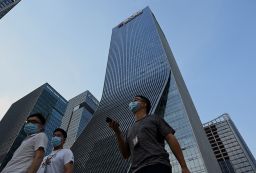The implosion of Lehman Brothers, 13 years ago this week, showed how the collapse of a single entity can send shockwaves around the world.
Echoes from that event are resounding today as a massive property developer on the other side of the world teeters on the brink of default.
The risk is that the collapse of Evergrande, a Chinese real estate company with a staggering $300 billion of debt outstanding, could set off a chain reaction that spreads overseas.
“Some fear an Evergrande meltdown will have systemic risks on par with the impact Lehman Brothers’ demise had on the US stock market,” Ed Yardeni, president of Yardeni Research, wrote in a note to clients Thursday.
Like Lehman in its heyday, Evergrande is massive, suggesting a default would be felt widely. The company has 200,000 employees, raked in more than $110 billion in sales last year and has more than 1,300 developments, according to Reuters.
Wall Street is keeping close tabs on the Evergrande situation, which highlights the extraordinary amount of borrowing Chinese companies and families have taken on over the years. Yet there are no signs that investors think an Evergrande default will infect US markets or the domestic economy.
No contagion, at least so far
For now, investors seem confident that authorities in Beijing would use their vast control over the Chinese economy to limit the damage. And there is no evidence, at least so far, of contagion in US markets.
“I don’t think the Evergrande meltdown, and the financial problems of Chinese property companies more broadly, will reverberate back on the US economy or markets,” Mark Zandi, chief economist at Moody’s Analytics, told CNN.
“We think that the ‘China’s Lehman moment’ narrative is wide of the mark,” Simon MacAdam, senior global economist at Capital Economics, wrote in a note on Thursday.
MacAdam said even a “messy collapse” of Evergrande would have “little global impact beyond some market turbulence.”

David Kotok, co-founder and chief investment officer of Cumberland Advisors, agrees, dismissing Evergrande as a “Chinese domestic credit problem.”
“It does not look as if it has any contagion effects on American companies or American financial markets,” Kotok said. “We see no credit spread widening,”
Credit spreads, the difference between corporate bonds and ultra-safe Treasury rates, remain very narrow. That’s a sign that investors aren’t worried — especially given the Federal Reserve’s unprecedented support for the economy and markets. Of course, that can change in a heartbeat.
“I would change my view at once if I saw any contagion or spillover” into the world’s biggest economies, Kotok said.
The US Treasury Department declined to comment on the Evergrande situation.
Growth engine to slow
Beyond the market impact, the collapse of Evergrande could affect China’s economy, the second-largest in the world after the United States, and a key catalyst for global growth.
Evergrande has already suspended work on some projects in a bid to conserve cash. Given the company’s size, that will put pressure on China’s real estate market.
“Property development has been a major growth engine for the Chinese economy over the last decade,” Guy Lebas, chief fixed income strategist at Janney Capital Management, told CNN in an email.
He said the lack of large-scale real estate development could slow China’s economy, though there is debate over how productive that growth was in the first place.
“While there may be modest knock-on effects in other economies, I don’t expect them to be too large,” Lebas said.
‘I don’t know if China can have a Lehman Moment’
Wall Street’s cautious optimism is driven by the fact that Beijing’s authoritarian government has enormous influence over what happens in China’s economy, financial markets and banking system. Consider Beijing’s recent crackdowns on everything from video games and casinos to ride-sharing.
“If it appears that a default(s) may ignite a financial crisis, Chinese authorities would almost certainly forestall this from happening,” Zandi of Moody’s said.
Kotok pointed out that in China, the government controls the rules of the road, right down to how much credit is extended to various parts of the economy.
“I don’t know if China can have a Lehman Moment,” Kotok said.
While Yardeni doesn’t expect Beijing to save Evergrande, he does see the government injecting enough liquidity to limit the damage.
“Or at least we hope so,” he said.


























